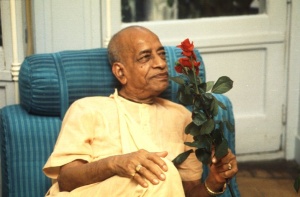SB 7.8.19-22
(Redirected from SB 7.8.19)

A.C. Bhaktivedanta Swami Prabhupada
TEXTS 19-22
- mīmāṁsamānasya samutthito 'grato
- nṛsiṁha-rūpas tad alaṁ bhayānakam
- pratapta-cāmīkara-caṇḍa-locanaṁ
- sphurat saṭā-keśara-jṛmbhitānanam
- karāla-daṁṣṭraṁ karavāla-cañcala-
- kṣurānta-jihvaṁ bhrukuṭī-mukholbaṇam
- stabdhordhva-karṇaṁ giri-kandarādbhuta-
- vyāttāsya-nāsaṁ hanu-bheda-bhīṣaṇam
- divi-spṛśat kāyam adīrgha-pīvara-
- grīvoru-vakṣaḥ-sthalam alpa-madhyamam
- candrāṁśu-gauraiś churitaṁ tanūruhair
- viṣvag bhujānīka-śataṁ nakhāyudham
- durāsadaṁ sarva-nijetarāyudha-
- praveka-vidrāvita-daitya-dānavam
SYNONYMS
mīmāṁsamānasya — of Hiraṇyakaśipu, who was contemplating the wonderful form of the Lord; samutthitaḥ — appeared; agrataḥ — in front; nṛsiṁha-rūpaḥ — the form of Nṛsiṁhadeva (half lion and half man); tat — that; alam — extraordinarily; bhayānakam — very fearful; pratapta — like molten; cāmīkara — gold; caṇḍa-locanam — having fierce eyes; sphurat — flashing; saṭā-keśara — by His mane; jṛmbhita-ānanam — whose face was expanded; karāla — deadly; daṁṣṭram — with a set of teeth; karavāla-cañcala — waving like a sharp sword; kṣura-anta — and as sharp as a razor; jihvam — whose tongue; bhrukuṭī-mukha — due to His frowning face; ulbaṇam — dreadful; stabdha — motionless; ūrdhva — extending upward; karṇam — whose ears; giri-kandara — like the caves of a mountain; adbhuta — very wonderful; vyāttāsya — with a widely opened mouth; nāsam — and nostrils; hanu-bheda-bhīṣaṇam — causing fear due to the separation of the jaws; divi-spṛśat — touching the sky; kāyam — whose body; adīrgha — short; pīvara — fat; grīva — neck; uru — broad; vakṣaḥ-sthalam — chest; alpa — small; madhyamam — middle portion of the body; candra-aṁśu — like the rays of the moon; gauraiḥ — whitish; churitam — covered; tanūruhaiḥ — with hairs; viṣvak — in all directions; bhuja — of arms; anīka-śatam — with a hundred rows; nakha — having nails; āyudham — as fatal weapons; durāsadam — very difficult to conquer; sarva — all; nija — personal; itara — and other; āyudha — of weapons; praveka — by use of the best; vidrāvita — caused to run; daitya — by whom the demons; dānavam — and the rogues (atheists).
TRANSLATION
Hiraṇyakaśipu studied the form of the Lord, trying to decide who the form of Nṛsiṁhadeva standing before him was. The Lord's form was extremely fearsome because of His angry eyes, which resembled molten gold; His shining mane, which expanded the dimensions of His fearful face; His deadly teeth; and His razor-sharp tongue, which moved about like a dueling sword. His ears were erect and motionless, and His nostrils and gaping mouth appeared like caves of a mountain. His jaws parted fearfully, and His entire body touched the sky. His neck was very short and thick, His chest broad, His waist thin, and the hairs on His body as white as the rays of the moon. His arms, which resembled flanks of soldiers, spread in all directions as He killed the demons, rogues and atheists with His conchshell, disc, club, lotus and other natural weapons.